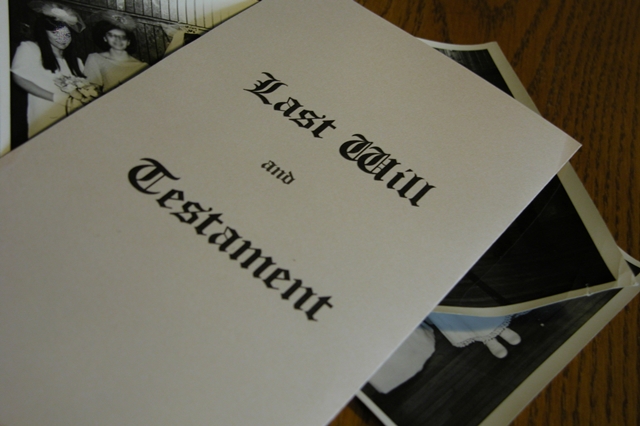Taking the \”Estate\” Out of \”Estate Planning\”

People hearing the term, “estate planning” or even “legacy planning,” often wince, squirm, and cringe unless they are within a very fortunate income tax bracket. However, not one to be deterred, when I receive the rolling eyes or blank stare, I reach into my “unraveling legalese” briefcase and offer the following clarification: Your “estate” is anything you own. It doesn’t have to be a million-dollar home or a 1967 Aston Martin. It can include the 150 classic jazz LPs that belonged to your father, your grandmother’s wedding ring, or you and your spouse’s stubs to the Blackhawks 2010 championship. The goodwill created in your small business is also part of your estate, your legacy. Additionally, included are contracts in which you’ve assigned rights to be effectuated at a certain time, i.e., life insurance. Note, however, that though life insurance is a component of your entire estate, it is not part of your probate estate. Estate planning is the process by which everything you own and will likely own or inherit, as well as your liabilities and obligations, is considered to determine how best to transfer your possessions to your heirs and/or intended beneficiaries. If you own a home, a retirement account, life insurance, have one or more dependents and a dog, deciding on who gets what and why is the process of estate planning. Estate planning is not limited to considering how beneficiaries can inherit tax-free or how one can use the current state and federal tax laws to the advantage of your living trust beneficiaries. Estate planning also includes anticipating scenarios such as ensuring that the needs of dependents or a partner with special challenges is provided for and providing for special beneficiaries who may not yet be born. Hence, estate planning is just planning for your future. It is not a tool merely for the wealthy; estate planning is a tool for the wise.
5 Reasons Why a Will Might Be for You

Generally, I advise clients that trusts are more appropriate, especially if the client wants his or her heirs or beneficiaries to avoid probate. Preventing an estate from going through probate is beneficial if the estate is sizable, i.e., consists of a house, life insurance, a retirement plan or securities, one or more automobiles, and furnishings. However, there are circumstances when a will may be more appropriate: If there is no will, then the property might be distributed to, or in proportions, someone unintended by the decedent. For example, your spouse might only receive 1/3 of the estate’s personal and real property and the remaining 2/3 will go to a child or relative who kicked your dog. Equally egregious is that the property could be distributed to the state, which may have already benefited from receiving several years of income and sales taxes from you. If the estate is modest, for example $100,000 – $200,000, avoiding probate is even more reasonable and it may be possible to waive a probate hearing, so a trust under these circumstances is probably unwarranted. A grantor may not want to designate a trustee and may not want to be a trustee during his or her lifetime.* So, by using a will, a sizable estate will go through probate but each legatee will ultimately be responsible for the preservation and enrichment – or diminution – of his or her own gift. If the testator has minor children and doesn’t want the court to determine guardianship in the event of death or incapacity, then a will can nominate who should be the guardian. A grantor with no desire to continually update a trust document may use a pour-over will, a simple mechanism by which all of the estate is designated to a trust. Okay, so this one is a compromise betwixt the 2 but \”4 1/2 Reasons…\” just didn\’t flow. * A settlor, also referred to as a “grantor,” is the individual who creates the trust.
Lucky Stars Unlucky Heirs: Even the Unfamous Should Have a Valid Will

Approximately 70% of Americans who should leave some sort of testamentary document or trust behind when they die don’t. Why? Because we don’t like thinking about the day when we’re no longer going to be around, let alone talking about it, and heaven forbid planning for it. So we procrastinate until we end up dead with loved ones on the cusp of committing murder or worse – battling each other in probate court until attorneys’ fees have engulfed most of the estate. I offer a few suggestions: Don’t be like Sonny Bono who died without a will and left his widow to battle with a man claiming to be Chaz’s illegitimate half-brother. If you’re married or in a civil union, try not to repeat Barry White’s mistake. “The Maestro” died not only intestate, i.e., without a will, but also without having divorced his first wife with whom he’d been estranged for decades. So if you’re going to put off the inevitable, don’t put off making your divorce or break-up legally valid. The Barry White Wars: (1) between long-time lover and mother of last child and estranged wife of about 20 years and mother of four, and (2) between his 9 children. Not that I think that many would share in the aspirations of Anna Nicole Smith, those who are reading this should consider when drafting your current estate plan that you may have another child after the plan is effectuated. So try not to accidentally disinherit the second child by leaving everything to your “only child, INSERT NAME HERE.” Finally, if you can satisfy suggestions 1 – 3 successfully, remember not to “be like Mike,” Michael Jackson, that is. If you have a trust, actually put something in it. Most know how literally indebted to the world Michael Jackson was, but if he had placed a few actual, fully-paid-for possessions in trust, the creditors would have probably been unlikely to gain access to those assets. A trust with nothing in it is invalid. Although I don’t suggest creating a bequest like the late Torontonian, Charles Millar, leaving everything to the Toronto woman who gave birth the most times in the 10 years following his death, I do suggest having something valid in place to protect your family, if not from others, then from themselves.
Embracing Online Legal Services…Toothpaste Shouldn\’t Go Back into the Tube

Welcome to The Lotus Rules, formerly known as the Shark Free Zone, the blog for my practice\’s web site. As an experienced blogger, admittedly, this first post is too long, but it\’s the first so I took license. Still, for the sake of you readers and my practice, subsequent postings will be shorter. I was going to write my inaugural piece on why most individuals should have something in place protecting their property and possessions in case they die. However, most, if not all, of the teleconferences, seminars, and webinars that I’ve recently attended were tinged with angst caused by online legal services. Inevitably, a participant would give a haughty, “We’re not afraid of you …humph!” when nothing could be further from the truth. So, the “why you should have something,” piece will make its debut next, as I now share a few observations on the brouhaha regarding online legal services. The fundamental perception underlying the online legal services debate is based on our profession’s steadfast and imprudent use of an outdated framework. The 3 sides of this frame are change aversion, fee generation, and professional egoism. Encompassed within are a myriad of factors, including risk aversion, money affection, perfectionism, and control- and structure-orientation. However, it is the bottom of this non-gendered triumvirate, our professional egoism, causing the most discord. Arguably, certain arguments opposing online services are justified, as is a certain amount of lawyer egoism. Many colleagues and I spent years of enormous effort, anxiety, sleepless nights, money we did not have, and BIG brain power to get to achieve our goal – acceptance in one of the most respected professions in the world. So, those of us who “survived” are now in an “elite” group and that has to mean something. Right? Yes, it does … within reason. The reasonable justifications for opposing online services and justifications for our egoism include: A very high standard of performance in communication and analysis, A deference and respect for those seeking our services because most folks don’t turn to an attorney unless there’s trouble afoot, A deference for and an ability to establish rules that can stand the test of time, lending stability and civility to our society, aka “precedent,” and A genuine desire to help others – not necessarily the altruistic human rights,\”let\’s save the internally displaced\” kind of help, but the “if you sign this contract as it’s written, you’ll lose your shirt” kind. However, the unreasonable justifications are what foster the profession’s debate and undergird the angst: Interpreting elite as exclusionary whereby understanding the law is our territory and online legal services are trespassing, Defining clients as those who can pay premium fees for our efforts, and Simply meaning that “we’re ‘in’ and you’re ‘out’; hence, we make the rules, hide their meanings, and change them whenever we want; and you follow the rules while we enjoy lavish lifestyles.” The reasonable justifications for opposing online legal services can be reconciled with supporting the same. However, those of us holding on to the unreasonable justifications are doing so perilously. Understanding the law is not the exclusive purview of lawyers. It is our duty to protect our clients’ rights. For us to discharge that duty, clients should at least know what their rights are, when their rights are in jeopardy, or when they\’ve been violated. Yet, lawyers don’t sit around coffee shops to see who’s writing the next “One L” and we certainly don\’t troll sweatshops calculating how long the seamstress has worked and for what amount of compensation. Ergo, clients must have some understanding of the law as it applies to them in order to seek protection or demand redress. Frankly, non-exclusivity in this context has generally been the case, so exclusivity is a meritless argument and efforts to continue hiding behind the curtain in Oz are foolhardy. Let me explain. Several decades ago, on Main Street, USA, Almost Famous Author finished \”Two L\” and told Neighbor Nikki about his manuscript, who then advised “call the Library of Congress and get it copyrighted; they’ve got the forms.” Almost Famous Author did as advised but also went to see Attorney Shingle. Attorney Shingle gave Almost Famous Author the forms at no charge, saying, “Call me if ya got any questions, and don’t worry about the fee ‘cause it won’t take long.” In fact, the visit with Shingle was free, too. Well, times changed. Main Street gentrified into Wall Street and Attorney Shingle joined BL & Associates, LLC where forms along with most visits were no longer free. Moreover, Attorney Shingle’s son also went to law school and joined BL, and so did Attorney Shingle’s grandson, and times were great for the profession. Now, times have changed again. Technology allows companies and firms to provide free or inexpensive legal forms and free information, with expeditious delivery, so that even wannabe famous writers who could afford BL are obtaining legal services online. Irrefutable is that the purveyors of the new free forms and information earn a comfortable living, but they are also doing something to offset a most egregious result of the second factor – limiting who obtains help by requiring clients to pay a premium’s premium fee. Firms embracing technology are providing access to legal services to those who needed them but often could not afford them. Technology helped unmask the rules and unlock their “hidden” meanings with “plain English.” As a result, the technology toothpaste is out of the tube, so to speak. Yet, all is not lost for lawyers and clients who prefer the traditional ways. The legal profession has a great opportunity in its impending transformation. Of course, some practice areas are too complex to lend themselves to online services, e.g., international intellectual property matters and corporate litigation. However, if lawyers in even complex areas can unbundle repetitive, redundant processes, the outcome will be greater efficiency, happier clients, more clients, and higher income without increasing fees. In contrast, some areas must change dramatically or technology will devour

